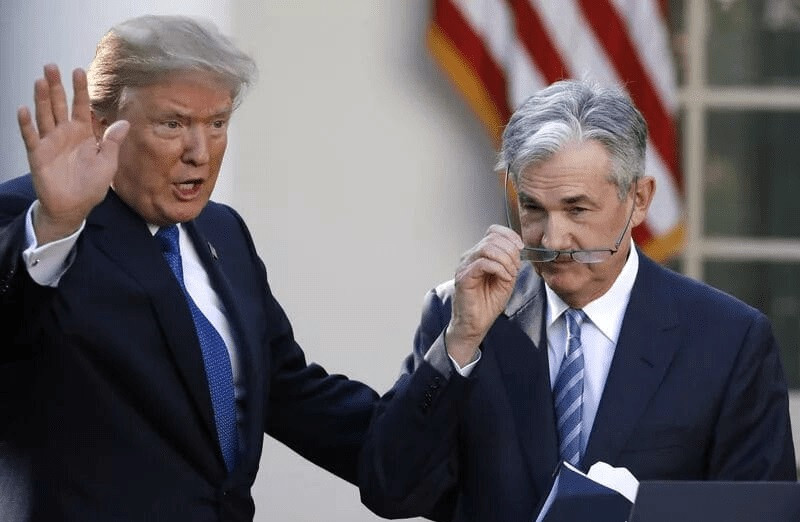See also


 22.04.2025 11:12 AM
22.04.2025 11:12 AMThe U.S. dollar fell to its lowest level since January 2024 after President Donald Trump's criticism of the Federal Reserve sparked concerns over the central bank's independence.
The dollar weakened against all major currencies after National Economic Council Director Kevin Hassett stated that Trump is considering the dismissal of Fed Chair Jerome Powell. These comments prompted a wave of dollar selling on Monday. Gold, which typically moves inversely to the U.S. currency, surged to a record high.
It's clear that Trump, frustrated by the Fed's reluctance to cut interest rates, stated last week that Powell's dismissal could happen rather quickly. Criticism of the Fed not only undermines the principle of central bank independence but also risks politicizing U.S. monetary policy in ways that markets could find deeply unsettling. However, similar tensions occurred during Trump's first term, and at the time, things ended relatively peacefully.
Firing Powell would be a major shock to the markets and the U.S. economy, so Trump's words are unlikely to be taken literally. Still, if the Fed's credibility is seriously called into question, it could significantly undermine trust in the dollar. Markets could begin to demand a premium for political risk on dollar-denominated assets—especially if this story gains traction in the coming days and weeks.
The decline in U.S. assets suggests that the once-popular "America First" trading strategy is gradually fading. That strategy was based on buying assets that benefit when the U.S. faces challenges, expecting a strong stimulus response from the Fed. But the landscape has changed: after Trump raised global tariffs, spooking the Treasury market and erasing trillions from global equity valuations, the dollar itself came under pressure. Among currencies, the euro and Swiss franc have led the gains—the euro, in particular, has climbed to a three-year high.
The dollar's decline isn't only about the Fed; it's also about diversification in the face of an escalating trade war. Asian countries hold many dollar-denominated deposits due to favorable interest rates, and capital inflows into those markets could increase further.
Yesterday, Chicago Fed President Austan Goolsbee warned against efforts to undermine the central bank's independence. "There is near-universal consensus among economists that monetary independence from political interference is necessary—for the Fed or any central bank to do its job," Goolsbee said. French Finance Minister Eric Lombard also warned that Trump would risk damaging trust in the dollar and destabilizing the U.S. economy if he removed Powell.
Technical Outlook
EUR/USD: Buyers now need to push through the 1.1570 level. Only a breakout above this area will allow for a test of 1.1625. From there, the pair may target 1.1675, although reaching this without the support of major institutional players could be difficult. The furthest target remains the high of 1.1699. In the event of a decline, significant buying interest is expected only near 1.1485. If support is lacking there, it would be advisable to wait for a retest of 1.1410 or consider long entries from around 1.1340.
GBP/USD: Pound buyers need to break the nearest resistance at 1.3420. Only then can they aim for 1.3465, which is expected to be a tough level to breach. The furthest upward target is 1.3510. If the pair drops, bears will try to take control at 1.3365. A breakout below this support would deal a serious blow to the bulls and push GBP/USD toward the 1.3305 low, with a potential drop to 1.3245.
You have already liked this post today
*The market analysis posted here is meant to increase your awareness, but not to give instructions to make a trade.
Markets have once again paused amid uncertainty over whether a trade agreement between the U.S. and China will be reached anytime soon. The cloud of uncertainty that Donald Trump
Very few macroeconomic events are scheduled for Tuesday, and none are significant. If we set aside all the tertiary reports, such as the GfK Consumer Confidence Index in Germany
On Monday, the GBP/USD currency pair also traded with low volatility and mainly moved sideways, although the British pound maintained a slight upward bias. Despite the lack of market-relevant news
Forex Chart
Web-version

Your IP address shows that you are currently located in the USA. If you are a resident of the United States, you are prohibited from using the services of InstaFintech Group including online trading, online transfers, deposit/withdrawal of funds, etc.
If you think you are seeing this message by mistake and your location is not the US, kindly proceed to the website. Otherwise, you must leave the website in order to comply with government restrictions.
Why does your IP address show your location as the USA?
Please confirm whether you are a US resident or not by clicking the relevant button below. If you choose the wrong option, being a US resident, you will not be able to open an account with InstaTrade anyway.
We are sorry for any inconvenience caused by this message.

